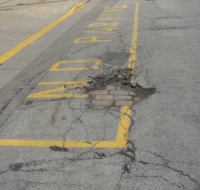The Battle Over the Wheel Tax
Local governments want to pass them for road maintenance, but state legislators may try to stop this.
When it comes to local governments across Wisconsin collecting a controversial “wheel tax” – a registration fee for vehicles weighing less than 8,000 pounds – to help maintain their streets and highways, the score is tied.
- Four local governments, including three cities (Amery, Sheboygan and Mayville) and Marathon County, once levied wheel taxes, but political pressure forced their repeal. Those taxes ranged from $5 to $10 per year.
- Four other local governments levy wheel taxes and have done so for years, while weathering any political fallout. The City of Milwaukee enacted its $20 wheel tax in 2008. It brought in $6.33 million in 2013 – cash that offsets special assessments for new projects and helps pay for badly-needed street maintenance. Three other cities – Beloit (started way back in 1986), Janesville (2012) and St. Croix County (2008) – have $10 annual wheel taxes. This raises about $535,000 for Janesville and $260,000 for Beloit.
Wheel taxes are added to the $75 annual state registration fee for cars and light trucks. Despite its mixed record, the tax is resurfacing as a possible option as local officials struggle to pay maintenance bills from the last snowy winter. Potholes caused by the freeze-and-thaw cycles of Wisconsin’s long and unpredictable winters are a problem in Southeastern Wisconsin and many other areas of the state. Local governments worry about the next winter, and don’t know how much future aid they can count on from state government.
And, a $10-per-vehicle wheel tax could be voted on Sept. 9 by Chippewa County supervisors. Officials there said winter highway maintenance normally costs about $1.2 million per year, but costs jumped to $2.1 million in 2013. They also don’t have money to deal with any snowstorms before Jan. 1. Chippewa County officials project a $10-per-vehicle tax would bring in up to $530,000 a year, but propose to “sunset” – or end – in five years.
Votes on Appleton and Chippewa County wheel taxes will be cast against a backdrop of uncertainty over how to pay for state and local transportation programs. State government borrowed almost $1 billion to avoid delaying highway, bridge and other transportation programs in the two-year budget that ends June 30. And the Wisconsin Taxpayers Alliance has done this math: Keeping state transportation funding at the 2013 level for 10 years would result in a deficit totaling $2 billion.
Yet Marquette University Law School polls note this contradiction: Wisconsin residents say they need and value good highways, but they also overwhelmingly reject paying higher state gas taxes or license-plate renewal fees to pay for them.
That political uncertainly has been noticed by local officials who are reconsidering a wheel tax. That’s why Chippewa County’s $10 wheel tax would last only five years, County Executive Frank Pascarella said last week. “It does allow us the opportunity to plan for funding the winter maintenance without impacting other county services,” Pascarella says. “Since this is a service delivery challenge for a number of counties, it does allow the Legislature time to address and provide counties the flexibility and ability within their operating budgets to provide this service without compromising, eliminating or ignoring other transportation or necessary and required … priorities.”
Nobody is pretending that wheel taxes are a permanent solution, however. “The wheel tax is an option for communities to consider that would provide a partial solution to the current challenges in funding the costs of maintaining local roads,” says Curt Witynski, chief lobbyist for the League of Wisconsin Municipalities. “Historically, it has not been used because local officials are loathe to add to the local tax burden.”
Kyle Christianson, chief lobbyist for the Wisconsin Counties Association agrees: “The wheel tax is only a partial solution, as it is inadequate to cover the growing demands of local transportation systems.”
One sign of how controversial wheel taxes remain: After St. Croix County adopted its $10 tax in 2008, state Republican Rep. Dean Knudson – a former mayor of Hudson – introduced a bill requiring that local governments obtain voter approval in a referendum before enacting a wheel tax. That bill died, but Knudson is a member of the Legislature’s Finance Committee. He may try again.
Steven Walters is senior producer for the non-profit public affairs channel WisconsinEye. Contact him at stevenscwalters@gmail.com
The State of Politics
-
A Wisconsin Political Trivia Quiz
 Dec 15th, 2025 by Steven Walters
Dec 15th, 2025 by Steven Walters
-
The Fight Over Wisconsin’s House Districts
 Dec 8th, 2025 by Steven Walters
Dec 8th, 2025 by Steven Walters
-
The Battle Over On-Line Betting
 Nov 24th, 2025 by Steven Walters
Nov 24th, 2025 by Steven Walters























Pay for good roads now, or pay for annual tire and suspension damages to a vehicle that can cost more than $1,000. Large trucks cause 80% or more of the damage to main roads that they drive on.
Wake up sheeple!!!
Pay for good roads or pay for new tires????? How about paying more and more for new roads while getting the the crappiest roads ever and having to replace new tires!!!!
As usual they (milw gov) take more in taxes, while taking more in user fees. IE license plate and water bills while they purposely don’t fix the roads or cut police and fire…stuff we actually need and want. Never mind the huge waste and fraud to the welfare slugs and crony kick backs to the criminal politicians. I left Milwaukee and its terrible over priced mismanaged ways…Saaalong suckers!!!
Where are all of the tax dollars going from all of the new development downtown?
Another suck from the shrinking middle class to subsidize the poor and the wealthy…
Oh, I’ve been pretty convinced that the $20 tax in City of Milwaukee is rather permanent.
They’re so popular that County of Milwaukee is proposing another $20.